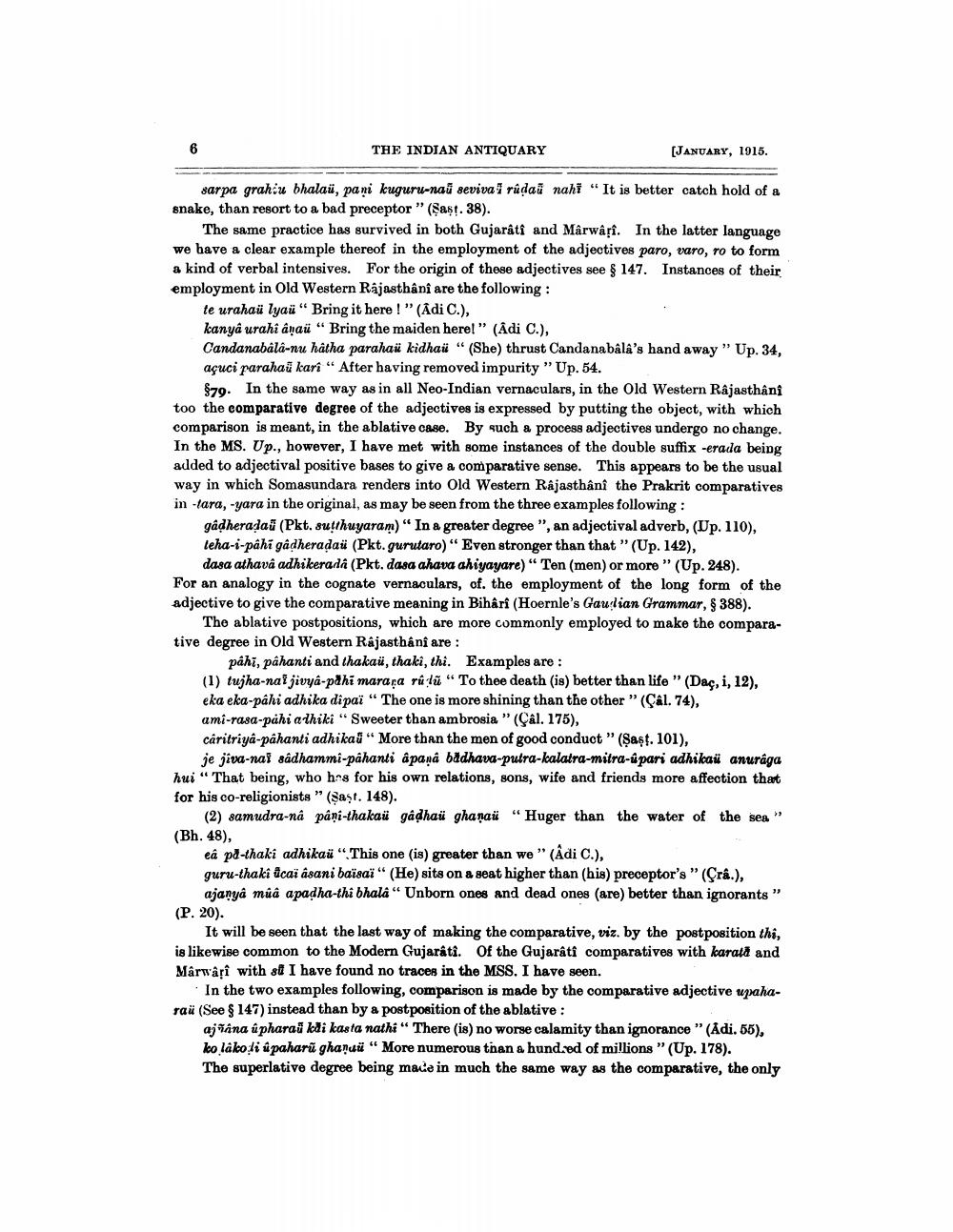________________
THE INDIAN ANTIQUARY
(JANUARY, 1915.
sarpa grahiu bhalai, pani kuguru-naū sevivai rudau nahi " It is better catch hold of a snake, than resort to a bad preceptor" (fast. 38).
The same practice has survived in both Gujarati and Marwâți. In the latter language we have a clear example thereof in the employment of the adjectives paro, varo, ro to form a kind of verbal intensives. For the origin of these adjectives see $ 147. Instances of their employment in Old Western Rajasthânî are the following:
te urahaü lyaü" Bring it here!" (Adi C.), kanya urahi anaü "Bring the maiden here!" (Adi C.), Candanabala-nu hátha parahaü kidhaü " (She) thrust Candanabâlâ's hand away " Up. 34, acuci parahau kari "After having removed impurity " Up. 54.
$79. In the same way as in all Neo-Indian vernaculars, in the Old Western Rajasthani too the comparative degree of the adjectives is expressed by putting the object, with which comparison is meant, in the ablative case. By such a process adjectives undergo no change. In the MS. Up., however, I have met with some instances of the double suffix -erada being added to adjectival positive bases to give a comparative sense. This appears to be the usual way in which Somasundara renders into Old Western Râjasthânî the Prakrit comparatives in-lara, -yara in the original, as may be seen from the three examples following:
gádheradau (Pkt. sulhuyaram)" In a greater degree ", an adjectival adverb, (Up. 110), leha-i-pâhi gadheradaü (Pkt. gurutaro) "Even stronger than that "(Up. 142),
dasa athavâ adhikerada (Pkt. dasa ahava ahiyayare)" Ten (men) or more" (Up. 248). For an analogy in the cognate vernaculars, of the employment of the long form of the adjective to give the comparative meaning in Bihari (Hoernle's Gaudian Grammar, $ 388).
The ablative postpositions, which are more commonly employed to make the comparative degree in Old Western Rajasthani are :
påhi, pahanti and thakaü, thaki, thi. Examples are : (1) tujha-nal jivya-påhi marara rûlü "To thee death (is) better than life" (Dac, i, 12), eka eka-pahi adhika dipaï" The one is more shining than the other" (Çal. 74), ami-rasa-påhi a thiki "Sweeter than ambrosia " (Çal. 175), câritriya-påhanti adhikaü " More than the men of good conduct" (şa$t. 101),
je jiva-nai sadhammi-pahanti apana badhava-putra-kalatra-mitra-upari adhikaü anuraga hui" That being, who hrs for his own relations, sons, wife and friends more affection that for his co-religionists" (şaşt. 148).
(2) samudra-na pâni-thakaü gadhaü ghanaü "Huger than the water of the sea (Bh. 48),
ea pd-thaki adhikaü "This one (is) greater than we" (Âdi C.), guru-thaki icas asani baïsaï" (He) sits on a seat higher than (his) preceptor's” (Fra.),
ajanya múa apadha-thi bhala" Unborn ones and dead ones (are) better than ignorants” (P. 20).
It will be seen that the last way of making the comparative, viz. by the postposition thi, is likewise common to the Modern Gujarati. Of the Gujarati comparatives with karati and Marwari with si I have found no traces in the MSS. I have seen.
In the two examples following, comparison is made by the comparative adjective upaharaü (See $ 147) instead than by a postposition of the ablative :
aj ana û pharau kdi kasta nathi " There (is) no worse calamity than ignorance" (Adi. 55), ko lako li úpaharūghaņuü "More numerous than a hund.od of millions "(Up. 178). The superlative degree being made in much the same way as the comparative, the only




